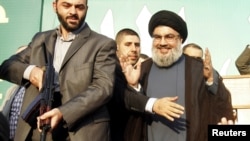The United States has accused two Lebanese foreign exchange companies of laundering millions of dollars for drug traffickers and Hezbollah militants.
The U.S. Treasury named the two Lebanese firms as “primary money laundering concerns” under the Patriot Act, which allows for identifying foreign companies that may be laundering money and supporting terrorism.
David Cohen is the Treasury Department’s Undersecretary for Terrorism and Financial Intelligence:
“We have taken this action because Rmeiti Exchange and Halawi Exchange use their money exchange businesses to move millions of dollars annually on behalf of narcotics traffickers and money launderers and for the benefit of Hezbollah," said Cohen.
U.S. officials say the money laundering scheme involved cocaine from South America that was transported through West Africa and sold in Europe. They say funds were then laundered through the Lebanese exchange companies and wired to banks in the United States and other countries.
They say the firms were used after the U.S. government in 2011 added the former Lebanese Canadian bank to a blacklist for its operations with Hezbollah.
Again the Treasury Department’s David Cohen:
“Hezbollah has long sought access to the international financial system in order to move its terrorist funds and to launder the profits from its involvement in illegal activity," he said. "Make no mistake, Hezbollah is both a full-fledged terrorist organization, lavishly funded over the years by Iran and an enterprise that increasingly turns to crime to finance itself.”
Hezbollah is regarded by the United States as a terrorist organization. In Lebanon, the group holds seats in parliament and operates numerous social programs.
Hezbollah also is supplying fighters to strengthen the Syrian government in that country’s civil war.
The Treasury Department ordered U.S. financial institutions to report any new transactions by the Lebanese firms, and it took measures to cut off both companies from the American banking system.
Officials say Western sanctions imposed on Iran because of its nuclear program have caused Hezbollah to turn increasingly toward the illegal drug trade to fund its operations.
Derek Maltz, a special agent with the Drug Enforcement Administration, said “Drugs and terrorism coexist across the globe in a marriage of mutual convenience. As state-sponsored terrorism has declined, these dangerous organizations have looked far and wide for resources and revenue to recruit, to corrupt, to train and to strengthen their regime.”
U.S. officials say the Lebanese foreign exchange firms wired money to the United States using financial institutions in countries that included China, Singapore and the United Arab Emirates.
The U.S. Treasury named the two Lebanese firms as “primary money laundering concerns” under the Patriot Act, which allows for identifying foreign companies that may be laundering money and supporting terrorism.
David Cohen is the Treasury Department’s Undersecretary for Terrorism and Financial Intelligence:
“We have taken this action because Rmeiti Exchange and Halawi Exchange use their money exchange businesses to move millions of dollars annually on behalf of narcotics traffickers and money launderers and for the benefit of Hezbollah," said Cohen.
U.S. officials say the money laundering scheme involved cocaine from South America that was transported through West Africa and sold in Europe. They say funds were then laundered through the Lebanese exchange companies and wired to banks in the United States and other countries.
They say the firms were used after the U.S. government in 2011 added the former Lebanese Canadian bank to a blacklist for its operations with Hezbollah.
Again the Treasury Department’s David Cohen:
“Hezbollah has long sought access to the international financial system in order to move its terrorist funds and to launder the profits from its involvement in illegal activity," he said. "Make no mistake, Hezbollah is both a full-fledged terrorist organization, lavishly funded over the years by Iran and an enterprise that increasingly turns to crime to finance itself.”
Hezbollah is regarded by the United States as a terrorist organization. In Lebanon, the group holds seats in parliament and operates numerous social programs.
Hezbollah also is supplying fighters to strengthen the Syrian government in that country’s civil war.
The Treasury Department ordered U.S. financial institutions to report any new transactions by the Lebanese firms, and it took measures to cut off both companies from the American banking system.
Officials say Western sanctions imposed on Iran because of its nuclear program have caused Hezbollah to turn increasingly toward the illegal drug trade to fund its operations.
Derek Maltz, a special agent with the Drug Enforcement Administration, said “Drugs and terrorism coexist across the globe in a marriage of mutual convenience. As state-sponsored terrorism has declined, these dangerous organizations have looked far and wide for resources and revenue to recruit, to corrupt, to train and to strengthen their regime.”
U.S. officials say the Lebanese foreign exchange firms wired money to the United States using financial institutions in countries that included China, Singapore and the United Arab Emirates.










